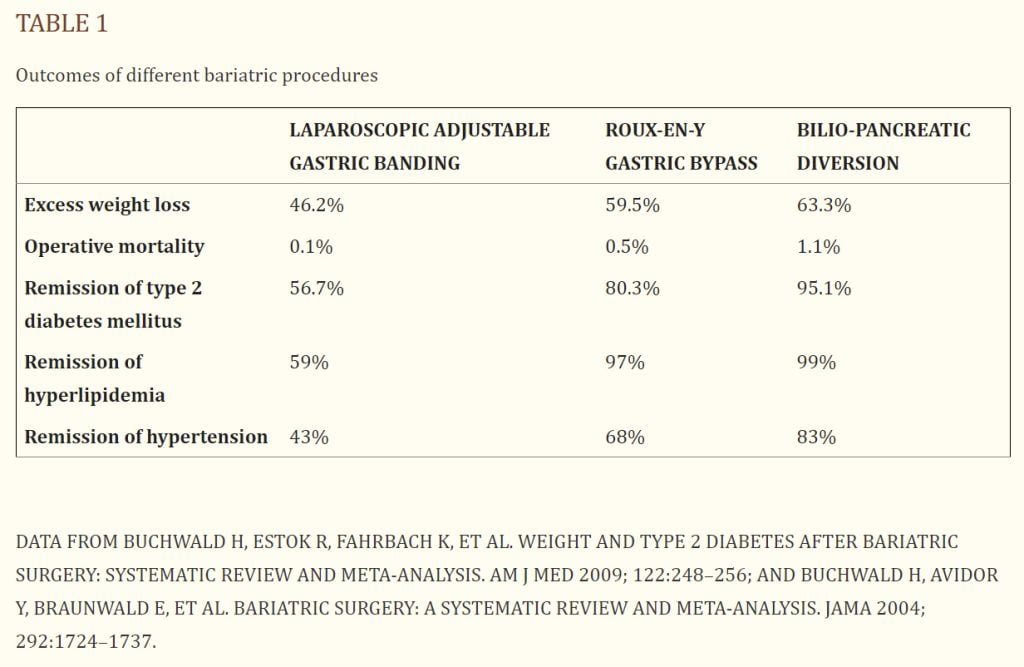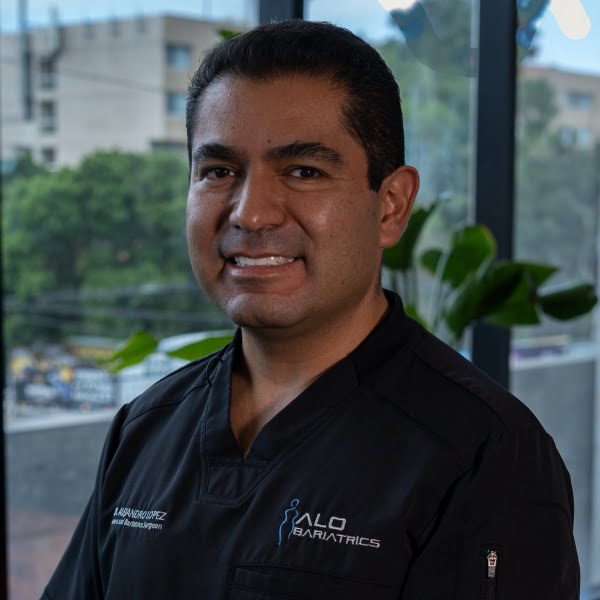Can Bariatric Surgery Treat Diabetes?
Now considered a global pandemic, type 2 diabetes (T2D) rates have tripled over the last 20 years. Over 10% of the US population has been diagnosed with diabetes, and another 97.6 million people in the US have prediabetes, a condition that will likely develop into full-blown diabetes.
One contributing factor to the development and progression of diabetes is obesity. This is why diabetes is considered a “Modern Preventable Pandemic.”
Diabetes is one of the most challenging conditions that patients and healthcare providers face, and every preventative measure to prevent the disease in a vulnerable population should be taken. Fortunately, bariatric surgery for diabetes and newer medications like Ozempic have been able to provide some relief in the form of long-lasting weight loss for many patients whose weight contributed to their condition.
Can Bariatric Surgery Treat Type 2 Diabetes?
Bariatric surgery doesn’t directly treat diabetes, but the weight loss that happens after surgery will benefit a person that has the condition. Weight reduction after surgery will positively affect a person’s metabolism and blood sugar control. The loss of excess body weight after bariatric surgery often leads to significant improvements in glycemic control or remission of diabetes.
Even patients who are on medication for the rest of their lives can fail to be able to control their blood sugar and still have complications from diabetes. The single best treatment for diabetes and a preventative approach you can take is to lose weight and eat a balanced diet.
The Relationship Between Obesity and Diabetes
There is a direct relationship between obesity and diabetes. Obesity is the leading risk factor for the development of type 2 diabetes. One of the primary mechanisms of how obesity contributes to diabetes is through insulin resistance.

Insulin is responsible for transferring glucose (blood sugar) into the cells to be used for energy or storage. When someone develops insulin resistance, their muscle, liver, and fat tissues do not respond to insulin as well as they did before. When the tissues don’t take up glucose from the blood, there’s more circulating through the body.
High levels of sugar damage the kidneys, eyes, heart, arteries, and veins. Many people who have uncontrolled diabetes develop cardiovascular complications and kidney disease. The risk of stroke, heart attack, nerve pain, and reduced kidney function are all significantly increased the worse your blood sugar control is.
Patients who have a high amount of body fat have worse insulin sensitivity, and as the weight continues to add on, the worse insulin sensitivity becomes and the worse the diabetes. If left unaddressed for too long, patients can become dependent on medications, including insulin, which may need to be injected up to four times a day or more under the skin. Bariatric surgery for diabetes is becoming an increasingly popular option for diabetics with weight problems.
How Weight Loss Counteracts Diabetes
Diabetes is considered a metabolic disorder that can be counteracted by losing weight. Since obesity is the leading cause of type 2 diabetes, it should come as no surprise that weight loss and reverse worsening blood sugar control. Here are a few of the specific ways that losing weight can counteract your diabetes.
- Improved Insulin Sensitivity: Losing weight, especially belly fat, will “reset” your body tissues’ response to insulin. Making it easier for your organs and tissues to take in glucose from the blood and use it for energy.
- Improved Pancreatic Beta Cell Function: When you lose excess weight, the cells in the pancreas that release insulin function more efficiently and effectively to control blood sugar spikes.
- Decreased Inflammation: Insulin resistance can become worse when inflammation is present. Obesity is like being in a constant state of low-grade inflammation in your body. Losing excess weight can reduce the overall amount of inflammation and insulin resistance.
- Liver Health: In diabetes, a majority of the patients have fatty liver. Glucose is stored and released in the liver and releases glucose into the blood in times of need (when you’re not eating). A less fatty liver allows the liver to function more properly.
The most effective way to combat diabetes is to lose weight. Your risk of developing severe complications from diabetes will significantly improve, and you’ll notice a difference in how you feel. Choosing weight loss as a way to treat your diabetes will help improve your energy levels, increase mobility, and provide a general sense of well-being. S
Can Bariatric Surgery Help Against Diabetes?
Bariatric surgery is an effective approach to addressing diabetes and obesity. Bariatric surgery offers an alternative to needing to take medications for the rest of your life to try and control your condition. Several bariatric procedures have been proven to help patients lose substantial weight and contribute to the lowering of diabetes-related complications.
Some of the most effective and popular bariatric procedures are the Roux-en-Y (gastric bypass)and sleeve gastrectomy (gastric sleeve) for producing dramatic weight loss. Here are some of the details of each procedure.
- Gastric bypass: This procedure creates a smaller pouch at the top of the stomach and reroutes a section of the small intestine. The surgery affects how much food you can eat and how many calories are absorbed. Patients with severe obesity can lose up to 80% of excess weight after gastric bypass, causing remission of diabetes in the majority of recipients.
- Gastric sleeve: With a sleeve gastrectomy, up to 75% of your stomach is removed. One key difference from gastric bypass is that there is no alteration of the small intestine with this surgery.


It depends on your goals to determine what type of bariatric surgery is best for type 2 diabetes. Surgeons at ALO Bariatrics have years of experience in performing gastric sleeve and gastric bypass. Both procedures can be performed through minimally invasive surgical techniques, which minimize the risk of complications and also speed up recovery.
Sleeve gastrectomy has an additional benefit in that it can be performed in using the single incision laparoscopic (SILS) technique. This allows your surgery to be completed through only one small incision near the belly button. Gastric sleeves from SILS have some of the lowest complication rates and fastest recovery times.
Is Bariatric Surgery a Permanent Cure for Diabetes?
Diabetes cannot be “cured,” but your blood sugar can return to the non-diabetes or prediabetes range. When your blood sugar is consistently in range, your body will no longer be at risk of being damaged from high blood sugar. A person who has diabetes and then has their blood sugar levels go back into normal range is considered to be in remission from diabetes.
Remarkably, up to 75% of patients who undergo bariatric surgery go into remission from diabetes. This is an even higher success rate than many of the medications used to treat diabetes. The gastric bypass procedure has the highest success rates for the amount of excess weight lost and for achieving remission.
Once you’re diagnosed with diabetes, it’s understandable to be discouraged that there isn’t a “cure” for the condition. But going into remission from diabetes is just as good as not having the condition at all. If you don’t want to take medications for the rest of your life to treat the condition and are looking for a long-term solution to both your diabetes and weight problems, bariatric surgery could be the answer.
Get a Professional Medical Opinion from ALO Bariatrics
If you’re considering bariatric surgery and want to better manage your diabetes through weight loss, speak with a surgeon from ALO Bariatrics today. Understanding the benefits and risks and embracing the lifestyle modifications needed post-surgery will help ensure the long-term success of your surgery.
Offering minimally invasive bariatric surgery options out of three locations in Mexico, our surgeons are standing by to help answer any questions you have. Contact us today.


Dr. Alejandro Lopez, the owner and lead bariatric surgeon at ALO Bariatrics, is a Fellow at the American College of Surgeons and is accredited with the American Society for Metabolic and Bariatric Surgery. He is also a certified bariatric surgeon by the Mexican College of Surgery for Obesity and Metabolic Diseases. He is one of two surgeons in Tijuana and one out of five to ten in all of Mexico who is able to provide robotic surgery.


